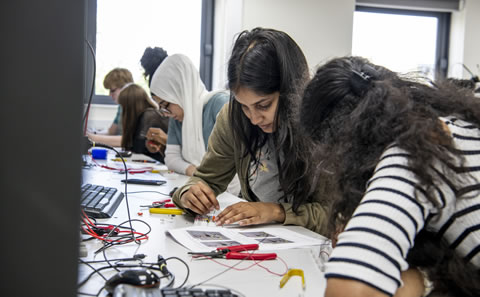Electronics and Computer Science Taster Course
25-29 July 2022, course fee £299 (reduced rate and full bursaries available)
If you love maths, technology or science, this course will enable you to apply your skills to computer science and electronic engineering. You will work on a variety of challenges, including investigating and designing solutions to real-world problems in our state-of-the-art undergraduate labs.
On the course, you will explore the domains of artificial intelligence, computer vision and cybersecurity, developing your programming skills and applying them to real problems. You will also simulate, prototype and solder together electronic circuits built from logic gates - the basic building blocks for all digital electonic systems, including computer processors - as well as learn about how complex chips are fabricated in our nanofabrication cleanrooms.
*COVID-19 Policy
We accept that our best-laid plans may have to change as a result of the ongoing pandemic. We are committed to running a safe and enjoyable course.
- If we decide to cancel the course, you will receive a full refund;
- If we decide to change to online delivery, you can choose to either 1) cancel and receive a full refund, or 2) attend the online course and receive a partial refund for the difference in course fee;
- If you are unable to attend due to government guidance at the time of the course (e.g. a requirement to self-isolate), you will receive a full refund.
The time I have spent in the labs has given me a lot of valuable skills and made me more sure of myself in regards to the practical aspects of the course.
What is Computer Science?
We use computers in every area of our lives; but getting computers to do what we want them to do requires specialist expertise and knowledge. Computer science is a problem solving science, modelling and analysing problems and providing solutions in engineering, health care, business and industry.
What is Electronic Engineering?
Electronics is the use of electricity to communicate, compute and control the world around us – from the processor in your phone, to the intelligent prosthetic arms that allow amputees to lead a normal life. Electronics is an engineering discipline and is underpinned by mathematics and physics. These are applied to designing and inventing cutting-edge products and systems.

